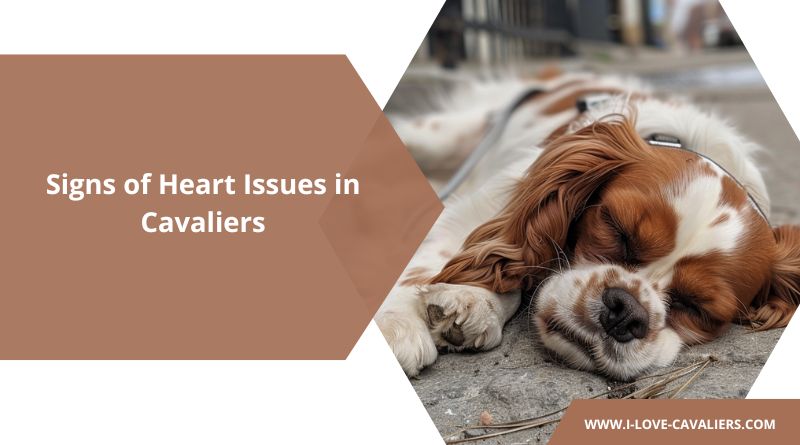Cavalier King Charles Spaniels are among the most affectionate and regal of companions, but their little hearts can sometimes be vulnerable to health issues.
Detecting heart problems early in Cavaliers can be challenging because the early stages often have no visible symptoms.
Have you considered the health of your furry friend’s heart lately?
Your Cavalier’s heart is at the center of their well-being, and being proactive about their heart health is crucial.
Heart issues often intensify with age, and most Cavaliers develop some type of cardiac condition by 5 to 6 years old.
Let’s dive into the telltale signs that could alert you to take action and ensure your beloved companion leads a heart-healthy life.
The Heart of the Matter
Mitral Valve Disease MVD – What’s That?
It’s a genetic condition where the mitral valve in the heart deteriorates over time. For Cavaliers, it’s, unfortunately, all in the family, meaning it’s super common in the breed.
- Age Matters: Most Cavaliers will develop a heart murmur, a tell-tale sign of MVD, by the time they’re 5, but it can kick in earlier.
- Listen Up: Vets can spot a heart murmur during check-ups with a keen ear and a stethoscope.
- Heart Health: Regular veterinary check-ups are crucial for catching and managing MVD early.
Early Signs of Heart Issues
Coughing, especially if it’s more frequent or intense after exercise or at night, can be a sign your pup’s heart is sending an SOS.
Difficulty breathing or rapid, labored breaths—when your Cavalier hasn’t been doubling as a furry athlete—could indicate heart trouble.
And about exercise – does your pup still have the pep in their step? Fatigue and a reduced willingness to exercise are red flags waving at you, saying, “Hey, check my heart!”
Sometimes, the signs aren’t as loud as a siren.
Maybe you’ve noticed subtle changes, like your Cavalier not being their usual charmingly mischievous self.
Behavioral changes or even slight breathing alterations can be telling; after all, they know themselves best and so do you.
Consider this your doggy detective checklist for heart health:
- Persistent Coughing: Is your dog coughing more frequently, especially after exercise or at night?
- Difficulty Breathing: Watch for rapid or labored breathing when at rest.
- Exercise Intolerance: Has their usual playtime or walk turned into a drag?
- Behavioral Changes: Not as playful or interactive as usual?
Stay vigilant with these observations. If you check any of the boxes above, it might be time for a heart-to-heart with your vet.
Risk Factors
Let’s chat about the risk factors that might play a role in your furry friend’s heart health. It’s like piecing together a puzzle; once you see how it all fits, you can take steps to keep your Cavalier’s heart beating strong.
Age
Your Cavalier isn’t just getting gray whiskers and wisdom with age—they’re also at risk for heart troubles.
Studies and vets concur that mitral valve disease tends to show up around age 5 to 6. So, keeping track of their birthdays isn’t just for party planning!
Genetics
Just like you might inherit your grandma’s twinkling eyes, Cavaliers can inherit heart issues.
It’s in their genes, with MVD predominantly considered a hereditary condition. Check your dog’s family history—if heart murmurs are a common refrain, early check-ups are key.
However, there are some other factors:
- Obesity: Carrying extra pounds isn’t just a human health hazard; it’s a canine concern too. Added weight makes your Cavalier’s heart work overtime, just like yours would.
- Lack of Exercise: You know that couch potato life? Not ideal for your Cavalier’s ticker. Regular walks and games of fetch aren’t just fun—they’re a cardio workout that keeps the heart muscle in shape.
What to Do If You Notice Symptoms
Your Cavalier King Charles Spaniel’s health is your number one priority, and recognizing the red flags for heart issues is crucial.
First things first—stay calm. Your pal can sense your anxiety.
If you observe any signs that might suggest heart problems, like coughing, difficulty breathing, or fatigue during exercise, your action plan should be swift and straightforward:
- Contact Your Vet: Make a phone call to your vet immediately. They know your Cavalier’s health history and will offer specific advice.
- Keep a Log: Note down the symptoms you’ve spotted. How frequent are they? Are there triggering factors? Scribble these down—it’ll be super helpful for your vet.
- Rest and Monitor: Provide a comfortable resting place for your Cavalier and keep a close eye on them. Monitor for any changes or worsening of symptoms.
Preventative Measures and Early Intervention
Taking proactive steps can significantly sway the odds in favor of your furry companion’s heart health.
Let’s break down what you can do!
Proper Diet
You are what you eat, and that stands true for your Cavalier too!
Keeping them on a balanced diet with the right amount of nutrients is key.
Go for high-quality dog food, and don’t forget to limit those irresistible table scraps.
Regular Exercise
All dogs need regular exercise, and Cavaliers are no exception.
Keep them moving with walks, games of fetch, or even agility classes. It keeps their waistlines in check and their hearts strong.
Routine Vet Check-ups
Trust me, your vet is your ally in the fight against heart issues.
Regular check-ups can catch early signs that might slip by unnoticed.
Cholesterol screenings are often recommended every five years, but your vet will personalize this based on your dog’s needs.
